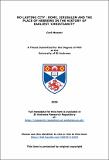No lasting city : Rome, Jerusalem and the place of Hebrews in the history of earliest 'Christianity'
Abstract
The contemporary study of Hebrews is bedeviled by anachronistic
assumptions that distort its interpretation. As a result, Hebrews holds a paradoxical
position in contemporary New Testament scholarship. After two centuries of critical
study little progress has been made on core introductory issues related to this epistle.
Consequently, many scholars are hesitant to utilize it significantly for investigation
into the origin and early development of Christianity. In contrast, Hebrews
specialists generally agree that Hebrews is a sermon that was sent to a group of
Christians in Rome. Some scholars even utilize it as a primary datum in the
investigation of Roman Christianity.
This thesis consists of a ground-clearing exercise and prolegomena for
reexamining the place of Hebrews in early Christian history. It begins by arguing
that Hebrews should not be read as a document of early Christianity, a religion
separate from Judaism, but as a document of Second Temple Judaism. It then
assesses the arguments for locating the recipients in Rome. When the evidence is
subjected to critical scrutiny we find that it precludes an Italian location. Likewise,
the arguments against locating the readers in Palestine fail and the evidence actually
points in that direction. Finally, the idea that Hebrews is a sermon is disproved and
new insight is gained into the situation that the epistle addresses. Significantly, we
find that the reference to a "word of exhortation" in 13:22 refers to an oracle received
by the readers which they were hesitant to obey.
The positive argument contends that Hebrews was sent to Jerusalem. New
exegetical insight into Rahab's commendation (11:31) gives strong support to this
contention. Additional support comes from the Temple Scroll, 4QMMT and other
Jewish texts which help prove that camp in 13:13-14 is a legal term of art that refers to
Jerusalem. These texts also help us see that the "strange teachings" in 13:9 refer to
halakhic innovations related to sacrifice. The readers reside in Jerusalem and are
urged to leave the city before it is destroyed.
Type
Thesis, PhD Doctor of Philosophy
Collections
Items in the St Andrews Research Repository are protected by copyright, with all rights reserved, unless otherwise indicated.

